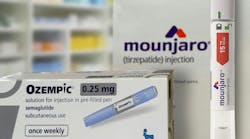Weight-loss drug prices climb with demand, but are the health benefits worth such high costs?
Since their beginnings as diabetic drugs, weight loss drugs like Ozempic have skyrocketed in popularity over the last few years. However, the cost for these types of medications is quite high ... and doesn't seem to be dropping anytime soon.
Manufacturers of these drugs have claimed they have the potential to lower health-care costs overall despite their high price tag, but that hasn't been realized so far, according to a new report from Reuters.
A costly endeavor
The price of Wegovy, Ozempic, and other similar GLP-1 drugs rose by 46% over two years for patients, with only one in four patients still taking medication after the two-year period. The full-year cost of care for U.S. patients with obesity is now roughly $18,507—which is a big spike compared to the previous average of $12,695.1
For patients taking GLP-1 medication, prescription drug costs drove most of this spending increase, but medical costs climbed over the last two years as well.1
Is it lowering obesity-related spending?
Novo Nordisk and rival Eli Lily, companies responsible for the GLP-1 weight-loss drug Zepbound, have earned billions of dollars from this medication hitting the market, but only a fraction of an estimated 100 million patients with obesity are taking it.
Novo and Eli Lily believe Zepbound will put money back in Americans' pockets by alleviating health conditions related to obesity, but Reuters analysts found "no reduction in obesity-related medical events," such as heart attacks, strokes, and type 2 diabetes diagnoses—or treatment for hypertension and high cholesterol—compared to a control group.1
Despite their effectiveness, many employers and government health officials are hesitant to provide coverage for these GLP-1 medications due to substantial upfront costs, not to mention uncertainty about any future savings. Providers and insurers could spend up to $11,200 for every patient taking a GLP-1 drug for obesity for the first two years due to the price of the drug and consistently high medical costs.1
Ben Ippolito, an economist at the American Enterprise Institute, said: "The budget hit here is frightening for a lot of governments and private entities. What makes these drugs different is the sheer size of the potential demand."
Justifying the cost of these types of drugs is tricky, especially since so few patients stick with their medications long-term not to mention the fact that fewer than 20% of members have coverage for weight-loss drugs.1
According to David Lassen, PBM's vice president for pharmacy clinical services: "We want to do everything possible to help individuals achieve the positive outcomes of being on this medication, but if we determine there is not a positive outcome with our data and there is not a return on investment, that will be an inflection point ahead that we will have to consider."
Some analysts believe the weight-loss market could reach $150 billion annually over the next decade. Considering these challenges, the future of weight-loss drugs like GLP-1 medications will depend on balancing their high costs with long-term health benefits and broader access to coverage.
Reference:
- Terhune C. Weight-loss drugs didn't curb health costs within two years. Reuters. October 2024. https://www.reuters.com/business/healthcare-pharmaceuticals/weight-loss-drugs-didnt-curb-health-costs-within-two-years-data-show-2024-10-24/








